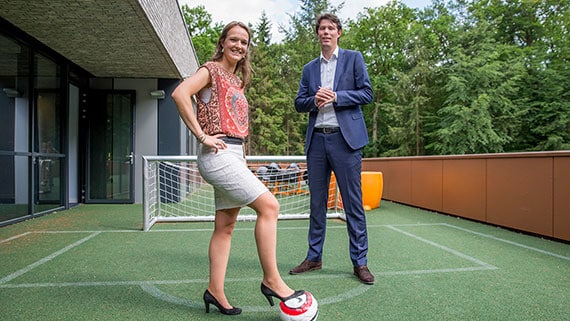
PwC's Responsible Business Simulator: for transparent and objective decision making
An approach for every strategic decision based on data and dialogue
PwC and Nyenrode Business University have developed the Responsible Business Simulator and made it available via open source. This model offers policymakers the opportunity to objectify and make their decision-making transparent and can be applied to a wide range of societal issues. The Responsible Business Simulator demonstrates its versatility and value for various sectors and issues. PwC and Nyenrode aim to contribute to facilitating objective and transparent decision making.

Open-Source opportunities
By making the model available via open source, PwC enables others to contribute to it. The condition is that developers also make their adjustments available via open source, so that others can build on them. In the public sector, transparency of information and (risk) models is extremely important. With this open-source model, organisations can provide transparency in decision-making on strategic and societal issues. The model can contribute to support and trust in institutions through explainable and traceable outcomes. Quantifying non-financial information in societal issues is crucial. Objective and transparent decision-making via the open-source model promotes understanding and support.
Application possibilities
The model has a wide range of application possibilities. Here are a few examples:
- Healthcare sector: healthcare institutions can use the model to analyse the impact of investments in sustainable employability, such as flexible work schedules and health programmes.
- Sports and Environment: the model can calculate the societal and economic impact of sports and develop strategies for reducing greenhouse gas emissions. Responsible Business Simulator has been used to calculate the societal and economic impact of football.
- Municipal policy: municipalities can use the model to determine the optimal budget allocation for the reception and integration of status holders, based on key performance indicators such as economic growth and social cohesion.
Example Municipalities
Optimal budget allocation for the reception and integration of status holders
Municipalities can use the open-source model, for example, to determine the method and the amount of money they allocate for the reception and integration of status holders in the community. The goal is an optimal budget allocation for the reception and integration of status holders. Municipalities can allocate budget for creating employment, education, transport, language courses or sports. To determine the most optimal distribution, they can set key performance indicators (KPIs) in the model, such as economic growth, social cohesion, mental and physical health, unemployment and sense of safety. For each of these KPIs, the model indicates the impact on different resident groups in a municipality. Based on a stakeholder dialogue, the importance of each KPI can be determined. Once these priorities are established, the model uses AI to calculate the optimal allocation of the available budget. If a municipality prioritises social cohesion, an outcome in the model could be to allocate funds primarily for sports and language programmes.
Benefits of the Responsible Business Simulator for policymakers
In the model, policymakers can make different combinations of policy instruments and use the outcomes to compare options, set priorities and allocate resources:
- Objective decision-making: the model helps policymakers to objectify strategic decision-making by making the impact of different options visible and transparent.
- Broadly applicable: from improving sustainable employability within healthcare institutions to calculating sport’s societal and economic impact and developing strategies for reducing greenhouse gas emissions.
- Open source: by making the model available via open source, others can contribute to its development. This promotes rapid improvements and increases transparency in the public sector.

How PwC can support you
Our human-led and tech-powered approach forms the basis for leveraging the possibilities offered by the Responsible Business Simulator. Together with you, we create solutions that help solve societal challenges. PwC provides support in implementing and adapting the Responsible Business Simulator to your specific needs. This can range from analysing the impact of investments to calculating the societal and economic impact of strategies.
In addition, PwC helps to quantify non-financial information in societal issues. By using data, scientific research and expert knowledge in combination with an optimisation algorithm (AI), PwC ensures that the outcomes of the model are explainable and traceable.
PwC also offers training and support to policymakers to help them use the model effectively. This includes setting key performance indicators (KPIs) and making different combinations of policy instruments to make the impact of different options visible and transparent.
Access to the Responsible Business Simulator
The Responsible Business Simulator is distributed in four ways:
- Python GitHub repository
- Python package called “Vlinder”
- Interactive Python Jupyter notebook
- Via an online platform
The accompanying figure illustrates the differences between these four options in terms of ease of use, transparency, and adaptability.
The most transparent way to work with this software is to use the code on GitHub. However, this requires programming knowledge and is therefore not the most user-friendly. By installing and importing the 'Vlinder' package in a Python environment, one can call the functions in this package without worrying about the source code. This obviously comes at the cost of some transparency. An even more user-friendly option is to work with the interactive Python notebook, which can also be found on GitHub. This notebook contains an example of how a decision-making case can be analysed. Although this is less transparent because the user only needs to change the name of the case to be analysed, it is very user-friendly. The most user-friendly way to work with the Responsible Business Simulator is to visit our online platform. Here, the user sees no code at all. If the user wants to host their own cases via this platform, PwC asks for a contribution to the hosting costs; analysing the demo cases is still free.

Curious about how PwC can help you make an impact through the Responsible Business Simulator?
Contact























